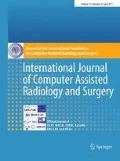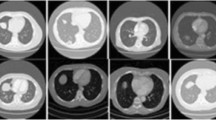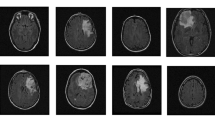Abstract
Purpose
The existing medical imaging tools have a detection accuracy of 97% for peritoneal metastasis(PM) bigger than 0.5 cm, but only 29% for that smaller than 0.5 cm, the early detection of PM is still a difficult problem. This study is aiming at constructing a deep convolution neural network classifier based on meta-learning to predict PM.
Method
Peritoneal metastases are delineated on enhanced CT. The model is trained based on meta-learning, and features are extracted using multi-modal deep Convolutional Neural Network(CNN) with enhanced CT to classify PM. Besides, we evaluate the performance on the test dataset, and compare it with other PM prediction algorithm.
Results
The training datasets are consisted of 9574 images from 43 patients with PM and 67 patients without PM. The testing datasets are consisted of 1834 images from 21 testing patients. To increase the accuracy of the prediction, we combine the multi-modal inputs of plain scan phase, portal venous phase and arterial phase to build a meta-learning-based multi-modal PM predictor. The classifier shows an accuracy of 87.5% with Area Under Curve(AUC) of 0.877, sensitivity of 73.4%, specificity of 95.2% on the testing datasets. The performance is superior to routine PM classify based on logistic regression (AUC: 0.795), a deep learning method named ResNet3D (AUC: 0.827), and a domain generalization (DG) method named MADDG (AUC: 0.834).
Conclusions
we proposed a novel training strategy based on meta-learning to improve the model’s robustness to “unseen” samples. The experiments shows that our meta-learning-based multi-modal PM predicting classifier obtain more competitive results in synchronous PM prediction compared to existing algorithms and the model’s improvements of generalization ability even with limited data.




Similar content being viewed by others
Availability of data and materials
The datasets generated and/or analysed during the current study are not publicly available due to data privacy but are available from the corresponding author on reasonable request.
References
Torre LA, Bray F, Siegel RL, Ferlay J, Lortet-Tieulent J, Jemal A (2015) Global cancer statistics 2012 CA: a cancer. J Clinic 65(2):87–108. https://doi.org/10.3322/caac.21262
Chen W, Zheng R, Baade PD, Zhang S, Zeng H, Bray F, Jemal A, Yu XQ, He J (2016) Cancer statistics in China 2015. A Cancer J Clinic 66:115–132. https://doi.org/10.3322/caac.21338
Franko J, Shi Q, Goldman CD, Pockaj BA, Nelson GD, Goldberg RM, Pitot HC, Grothey A, Alberts SR, Sargent DJ (2012) Treatment of colorectal peritoneal carcinomatosis with systemic chemotherapy: a pooled analysis of north central cancer treatment group phase III trials N9741 and N9841. J Clin Oncol 30:263–267. https://doi.org/10.1200/JCO.2011.37.1039
Thomassen I, van Gestel YR, van Ramshorst B, Luyer MD, Bosscha K, Nienhuijs SW, Lemmens VE, de Hingh IH (2014) Peritoneal carcinomatosis of gastric origin: a population-based study on incidence, survival and risk factors. Int J Cancer 134:622–628. https://doi.org/10.1002/ijc.28373
Cunningham D, Atkin W, Lenz HJ, Lynch HT, Minsky B, Nordlinger B, Starling N (2010) Colorectal cancer. Lancet 375(9719):1030–1047
Gomez-Portilla A, Cendoya I, Lopez de Tejada I, Olabarria I, Magrach L, Martínez de Lecea C, Gil A, Valdovinos M, Larrabide I, Ruiz de Alegría N, Fernandez JL, Cachorro I, Contreras M, Castaneda J, Uriarte A, Boado MV, Urturi JA, Ulibarrena MA (2005) Principles of the treatment of peritoneal carcinomatosis due to colorectal cancer. Curr Rev Update Cir Esp 77(1):6–17. https://doi.org/10.1016/s0009-739x(05)70796-x
Lemmens VE, Klaver YL, Verwaal VJ, Rutten HJ, Coebergh JW, de Hingh IH (2011) Predictors and survival of synchronous peritoneal carcinomatosis of colorectal origin: a population-based study. Int J Cancer 128:2717–2725. https://doi.org/10.1002/ijc.25596
Segelman J, Granath F, Holm T, Machado M, Mahteme H, Martling A (2012) Incidence, prevalence and risk factors for peritoneal carcinomatosis from colorectal cancer. Br J Surg 99:699–705. https://doi.org/10.1002/bjs.8679
Shida D, Tsukamoto S, Ochiai H, Kanemitsu Y (2018) Long-term outcomes after R0 resection of synchronous peritoneal metastasis from colorectal cancer without cytoreductive surgery or hyperthermic intraperitoneal chemotherapy. Ann Surg Oncol 25:173–178. https://doi.org/10.1245/s10434-017-6133-7
Cao C, Yan TD, Black D, Morris DL (2009) A systematic review and meta-analysis of cytoreductive surgery with perioperative intraperitoneal chemotherapy for peritoneal carcinomatosis of colorectal origin. Ann Surg Oncol 16:2152–2165. https://doi.org/10.1245/s10434-009-0487-4
Koh JL, Yan TD, Glenn D, Morris DL (2009) Evaluation of preoperative computed tomography in estimating peritoneal cancer index in colorectal peritoneal carcinomatosis. Ann Surg Oncol 16:327–333. https://doi.org/10.1245/s10434-008-0234-2
Don D, Tang L, Li ZY, Fang MJ, Gao JB, Shan XH, Ying XJ, Sun YS, Fu J, Wang XX, Li LM, Li ZH, Zhang DF, Zhang Y, Li ZM, Shan F, Bu ZD, Tian J, Ji JF (2019) Development and validation of an individualized nomogram to identify occult peritoneal metastasis in patients with advanced gastric cancer. Annal Oncol : Off J Eurp Soc Med Oncol 30(3):431–438. https://doi.org/10.1093/annonc/mdz001
Chao WL, Manickavasagan H, Krishna SG (2019) Application of artificial intelligence in the detection and differentiation of colon polyps: a technical review for physicians. Diagnostics (Basel Switzerland) 9:99. https://doi.org/10.3390/diagnostics9030099
Wang P, Xiao X, Glissen Brown JR, Brown G, Berzin TM, Tu M, Xiong F, Hu X, Liu P, Song Y, Zhang D, Yang X, Li L, He J, Yi X, Liu J, Liu X (2018) Development and validation of a deep-learning algorithm for the detection of polyps during colonoscopy. Nat Biomed Eng 2:741–748. https://doi.org/10.1038/s41551-018-0301-3
Urban G, Tripathi P, Alkayali T, Mittal M, Jalali F, Karnes W, Baldi P (2018) Deep learning localizes and identifies polyps in real time with 96% accuracy in screening colonoscopy. Gastroenterology 155:1069-1078.e8. https://doi.org/10.1053/j.gastro.2018.06.037
Ardila D, Kiraly AP, Bharadwaj S, Choi B, Reicher JJ, Peng L, Tse D, Etemadi M, Ye W, Corrado G, Naidich DP, Shetty S (2019) End-to-end lung cancer screening with three-dimensional deep learning on low-dose chest computed tomography. Nat Med 25:954–961. https://doi.org/10.1038/s41591-019-0447-x
Jiang Y, Jin C, Yu H, Wu J, Chen C, Yuan Q, Huang W, Hu Y, Xu Y, Zhou Z, Fisher GA, Jr G LG, Li R (2020) Development and validation of a deep learning CT signature to predict survival and chemotherapy benefit in gastric cancer: a multicenter, retrospective study. Ann Surg 274(6):e1153–e1161. https://doi.org/10.1097/SLA.0000000000003778
Hornbrook MC, Goshe R, Choman E, O’Keeffe-Rosetti M, Kinar Y, Liles EG, Rust KC (2017) Early colorectal cancer detected by machine learning model using gender, age, and complete blood count data. Dig Dis Sci 62:2719–2727. https://doi.org/10.1007/s10620-017-4722-8
Horie Y, Yoshio T, Aoyama K, Yoshimizu S, Horiuchi Y, Ishiyama A, Hirasawa T, Tsuchida T, Ozawa T, Ishihara S, Kumagai Y, Fujishiro M, Maetani I, Fujisaki J, Tada T (2019) The diagnostic outcomes of esophageal cancer by artificial intelligence using convolutional neural networks. Gastrointest Endosc 89:25–32. https://doi.org/10.1016/j.gie.2018.07.037
Ji Y, Li H, Edwards AV, Papaioannou J, Ma W, Liu P, Giger ML (2019) Independent validation of machine learning in diagnosing breast Cancer on magnetic resonance imaging within a single institution. Cancer Imaging 19:64. https://doi.org/10.1186/s40644-019-0252-2
Hirasawa T, Aoyama K, Tanimoto T, Ishihara S, Shichijo S, Ozaw T, Ohnishi T, Fujishiro M, Matsuo K, Fujisaki J, Tada T (2018) Application of artificial intelligence using a convolutional neural network for detecting gastric cancer in endoscopic images. Gastric Cancer 21:653–660. https://doi.org/10.1007/s10120-018-0793-2
Huang YQ, Liang CH, He L, Tian J, Liang CS, Chen X, Ma ZL, Liu ZY (2016) Development and validation of a radiomics nomogram for preoperative prediction of lymph node metastasis in colorectal cancer. J Clinic Oncol: Off J Am Soc Clinic Oncol 34(18):2157–2164. https://doi.org/10.1200/JCO.2015.65.9128
Chang-Yun L, Yonemura Y, Ishibashi H, Sako S, Tsukiyama G, Kitai T, Matsuki N (2011) Evaluation of preoperative computed tomography in estimating peritoneal cancer index in peritoneal carcinomatosis. Gan To Kagaku Ryoho 38:2060–2064
Yuan Z, Xu T, Cai J, Zhao Y, Cao W, Fichera A, Liu X, Yao J, Wang H (2022) Development and validation of an image-based deep learning algorithm for detection of synchronous peritoneal carcinomatosis in colorectal cancer. Ann Surg 275(4):e645–e651. https://doi.org/10.1097/SLA.0000000000004229
Chelsea A Pieter, and L Sergey (2017) Model-agnostic meta-learning for fast adaptation of deep networks. In International conference on machine learning (pp. 1126–1135). PMLR.
Kingma D P, Ba J L (2014) Adam: A method for stochastic optimization. In ICLR 2015
Shao R, Lan X, Li J, and Yuen P C (2019) Multi-adversarial discriminative deep domain generalization for face presentation attack detection. In Proceedings of the IEEE/CVF conference on computer vision and pattern recognition pp. 10023–10031
Donahue J, Jia Y, Vinyals O, Hoffman J, Zhang N, Tzeng E, Darrell T (2014) Decaf: A deep convolutional activation feature for generic visual recognition. In International conference on machine learning (pp. 647–655). PMLR.
Li M, Sun K, Dai W, Xiang W, Zhang Z, Zhang R, Wang R, Li Q, Mo S, Han L, Tong T, Liu Z, Tian J, Cai G (2020) Preoperative prediction of peritoneal metastasis in colorectal cancer using a clinical-radiomics model. Eur J Radiol 132:109326. https://doi.org/10.1016/j.ejrad.2020.109326
Acknowledgements
Not applicable
Funding
Not applicable.
Author information
Authors and Affiliations
Contributions
All authors contributed to the study conception and design. Material preparation, data collection and analysis were perfomed by bin li, luan ye, lingxiang ruan, the first draft of the manuscript was written by hangyu zhang and all authors commented on previous versions of the manuscript. All authors read and approved the final manuscript.
Corresponding authors
Ethics declarations
Conflict of interest
The authors declare that they have no competing interests.
Consent to publication
Not applicable.
Ethics approval and consent to participate
This study was approved by the ethics committee of the first affiliated hospital of Zhejiang university and informed consent was waived.
Additional information
Publisher's Note
Springer Nature remains neutral with regard to jurisdictional claims in published maps and institutional affiliations.
Rights and permissions
About this article
Cite this article
Zhang, H., Zhu, X., Li, B. et al. Development and validation of a meta-learning-based multi-modal deep learning algorithm for detection of peritoneal metastasis. Int J CARS 17, 1845–1853 (2022). https://doi.org/10.1007/s11548-022-02698-w
Received:
Accepted:
Published:
Issue Date:
DOI: https://doi.org/10.1007/s11548-022-02698-w




